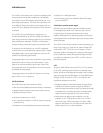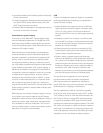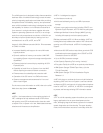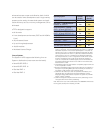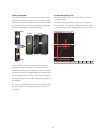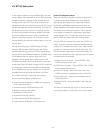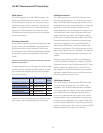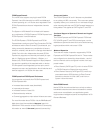Additionally, several service enhancements have also
been designed to avoid unscheduled outages and include
continued focus on fi rmware quality, reduced chip count
on Single Chip Module (SCM) and memory subsystem
improvements. In the area of scheduled outage enhance-
ments include redundant 100Mb Ethernet service network
with VLAN, rebalance of PSIFB and I/O fanouts, and single
processor core sparing and checkstop. Exclusive to the
System z10 is the ability to hot swap ICB-4 and Infi niBand
hub cards.
Enterprises with IBM System z9 BC and IBM z890
may upgrade to any z10 Business Class model. Model
upgrades within the z10 BC are concurrent. If you desire
a consolidation platform for your mainframe and Linux
capable applications, you can add capacity and even
expand your current application workloads in a cost-effec-
tive manner. If your traditional and new applications are
growing, you may fi nd the z10 BC a good fi t with its base
qualities of service and its specialty processors designed
for assisting with new workloads. Value is leveraged with
improved hardware price/performance and System z10 BC
software pricing strategies.
The z10 BC is specifi cally designed and optimized for
full z/Architecture compatibility. New features enhance
enterprise data serving performance, industry leading
virtualization capabilities, energy effi ciency at system
and data center levels. The z10 BC is designed to further
extend and integrate key platform characteristics such as
dynamic fl exible partitioning and resource management in
mixed and unpredictable workload environments, provid-
ing scalability, high availability and Qualities of Service
(QoS) to emerging applications such as WebSphere, Java
and Linux.
With the logical partition (LPAR) group capacity limit on
z10 BC, z10 EC, z9 EC and z9 BC, you can now specify
LPAR group capacity limits allowing you to defi ne each
LPAR with its own capacity and one or more groups of
LPARs on a server. This is designed to allow z/OS to
manage the groups in such a way that the sum of the
LPARs’ CPU utilization within a group will not exceed the
group’s defi ned capacity. Each LPAR in a group can still
optionally continue to defi ne an individual LPAR capacity
limit.
The z10 BC has one model with a total of 130 capacity
settings available as new build systems and as upgrades
from the z9 BC and z890.
The z10 BC model is designed with a Central Processor
Complex (CPC) drawer with Single Chip Modules (SCM)
that provides up to 10 Processor Units (PUs) that can
be characterized as either Central Processors (CPs), IFLs,
ICFs, zAAPs or zIIPs.
Some of the signifi cant enhancements in the z10 BC that
help bring improved performance, availability and function
to the platform have been identifi ed. The following sections
highlight the functions and features of the z10 BC.
13




